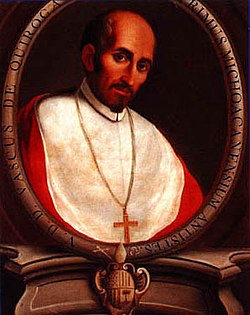Venerable Vasco de Quiroga | |
|---|---|
 Vasco de Quiroga, member of the second Audiencia and first bishop of Michoacán | |
| Born | Vasco de Quiroga 1470 or '78 |
| Died | 14 March 1565 (aged 86–94) |
| Burial place | Basílica de Nuestra Señora de la Salud, Pátzcuaro, Michoacán, Mexico |
| Nationality | Crown of Castile |
| Alma mater | University of Salamanca[1] |
| Occupation(s) | Bishop, judge, bureaucrat |
| Title | Bishop of Michoacán |
| Church | Roman Catholic Church |
| Archdiocese | Michoacán |
| See | Michoacán |
| Appointed | 18 August 1536 |
| Term ended | 14 March 1565 |
| Predecessor | None |
| Successor | Antonio Ruíz de Morales y Molina, O.S. |
| Orders | |
| Consecration | 5 January 1539 by Fray Juan de Zumárraga, O.F.M. |
| Rank | Bishop |
| Sainthood | |
| Feast day | 14 March |
| Venerated in | Roman Catholic Church |
| Title as Saint | Venerable |
| Judge of the Real Audiencia of Mexico | |
| In office 10 January 1531 – 16 April 1535 | |
| President | Sebastián Ramírez de Fuenleal |
| Preceded by | Nuño de Guzmán of the first Audiencia |
| Succeeded by | Antonio de Mendoza, Viceroy of New Spain |
Vasco de Quiroga (1470/78 – 14 March 1565)[2] was the first bishop of Michoacán, Mexico, and one of the judges (oidores) in the second Real Audiencia of Mexico – the high court that governed New Spain – from January 10, 1531, to April 16, 1535.
Coming from a background as a lawyer and a judge he was appointed to be a judge in the second Audiencia after the first Audiencia's failure. As an oidor he took a strong interest in restoring order to the Michoacán area which had been ravaged by rebellions and unrest. He employed a strategy of congregating indigenous populations into congregated Hospital-towns called Republicas de Indios, organized after principles derived from Thomas More's Utopia. The purpose of this policy was to teach the Indians a trade and to instruct them in Christian values and lifestyles. He established multiple such hospitals: Santa Fé de México close to the town of Tacubaya in the Valley of Mexico, and Santa Fé de la Laguna close to Pátzcuaro, Michoacán, and Santa Fe Del Rio close to La Piedad, Michoacan.
Because of his contribution to the protection of the Indians, Vasco de Quiroga's legacy is recognized in America and Spain, and even venerated in the Catholic Church.[3][4]
- ^ Cite error: The named reference
uvaq2020was invoked but never defined (see the help page). - ^ Wood, Stephanie (1996), "Vasco de Quiroga", Encyclopedia of Latin American History and Culture, vol. 4, New York: Charles Scribner's Sons, p. 515
- ^ Vatican News (22 December 2020). "Pope advances causes for canonization with publication of Decrees". Vatican News. Retrieved 13 Feb 2021.
- ^ Forbes staff (2020-12-22). "Papa abre camino a beatificación de Vasco de Quiroga". Forbes Mexico (in Spanish). Retrieved 2022-06-18.